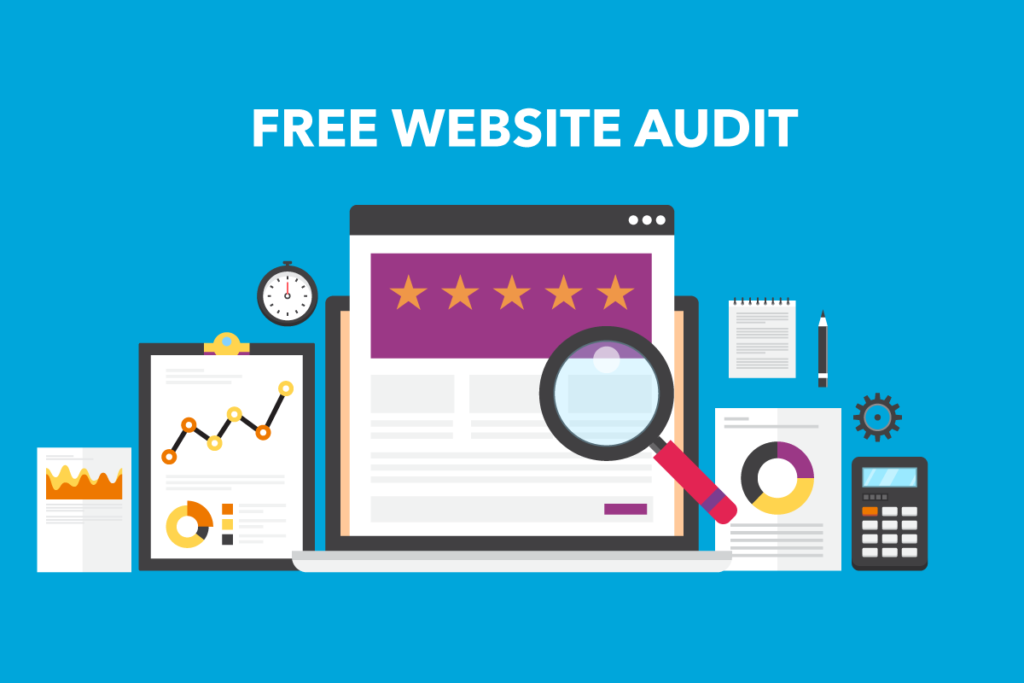WEBSITE AUDIT SERVICES

Free Website Audit
A website audit is a process of analyzing your website’s performance, usability, and SEO factors to identify and fix any issues that may affect your ranking, traffic, and conversions. It can help you improve your website’s overall quality and user experience, as well as optimize it for search engines and your target audience.
Why do you need a website audit?
It’s essential for any website owner who wants to achieve their online goals. Whether you want to increase your organic traffic, generate more leads, or boost your sales, you need to make sure that your website is in good shape and follows the best practices of web design and SEO.
Some of the benefits of a website audit are:
- It can reveal any technical errors or glitches that may prevent your website from loading fast, displaying correctly, or being crawled and indexed by search engines.
- It can help you optimize your website’s structure, navigation, content, and keywords to match the intent and expectations of your visitors.
- It can help you identify gaps or opportunities in your content strategy, such as missing topics, duplicate pages, low-quality content, or outdated information.
- It can help you improve your website’s security, accessibility, and compliance with web standards and regulations.
- It can help you measure your website’s performance against your competitors and industry benchmarks, and provide you with actionable insights and recommendations to improve it.
How to do a website audit?
It can be done manually or with the help of various tools and software. However, doing a manually can be time-consuming and tedious, especially if you have a large or complex website. That’s why it’s recommended to use some of the available tools and software that can automate the process and provide you with detailed reports and analysis.
1. Ahref Site Audit Tool
This tool can crawl all the pages on your website and check them for over 140+ pre-defined SEO issues, such as performance, HTML tags, social tags, content quality, localization, incoming links, outgoing links, resources, external pages, and more. It can also visualize your data in charts, flag all possible SEO issues, and provide recommendations on how to fix them. You can also customize your data with filters and parameters, and track your progress over time.
2.SEOptimer
This tool can analyze your website for common SEO issues and optimization best practices. It can also provide you with a free website analysis report that includes an overall SEO health score, a summary of issues and improvements, and a breakdown of various aspects of your website, such as usability, performance, social media presence, security, domain authority, backlinks profile, keywords ranking, etc.
How to use the results of a website audit?
Once you have done a website audit and obtained the results, you need to use them to improve your website and achieve your online goals. Here are some steps that you can follow:
- Prioritize the issues based on their impact and difficulty. Start with the most critical and urgent issues that may affect your website’s functionality or ranking. Then move on to the less important or more challenging issues that may require more time or resources to fix.
- Implement the recommendations provided by the tools or software. Follow the best practices and guidelines suggested by the tools or software to fix the issues and optimize your website. You may need to consult with a web developer or an SEO expert if you encounter any technical difficulties or need professional advice.
- Monitor the results and measure the impact. After implementing the changes, you need to monitor your website’s performance and see if there are any improvements or changes in your ranking, traffic, or conversions. You can use various metrics and tools to measure the impact of your website audit, such as Google Analytics, Google Search Console, Ahrefs, etc.
- Repeat the process regularly. A website audit is not a one-time thing. You need to repeat the process regularly to keep your website updated and optimized.
- Conclusion
A website audit is vital for any website owner who wants to improve their online presence and achieve their online goals. By doing a website audit regularly, you can identify and fix any issues that may affect your website’s performance, usability, and SEO factors. You can also optimize your website for search engines and your target audience. You can use various tools and software to automate the process and provide you with detailed reports and analysis. You can then use the results to implement the changes and measure the impact.
